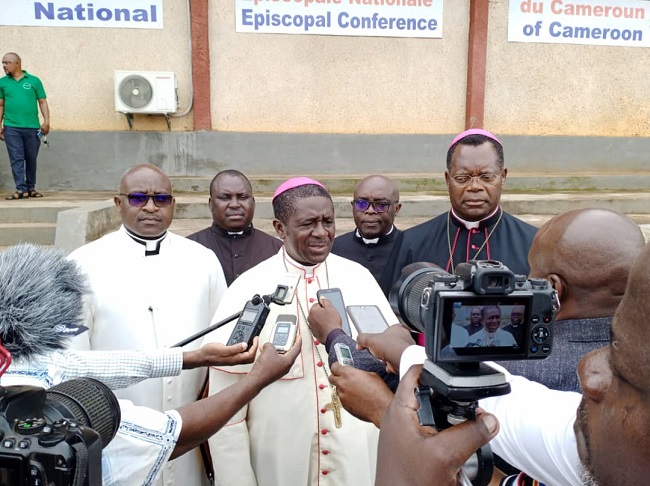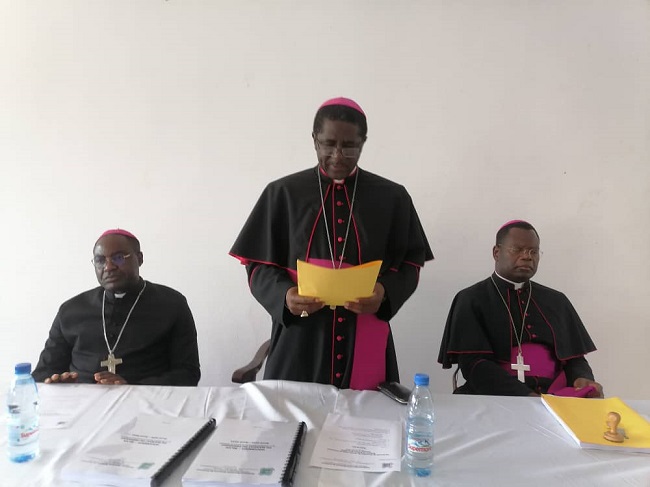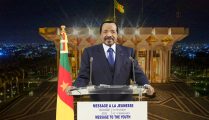30, October 2024
Archbishop Nkea says African Bishops pleased with outcome of Synod 0
African bishops at the Synod on Synodality played a key role in fending off efforts to give episcopal conferences greater doctrinal autonomy and are satisfied overall with the gathering’s final recommendations, which Pope Francis has formally adopted, a leading African prelate says.
How the African Church would help shape the synod’s concluding assembly was one of the event’s major storylines, in the wake of the continent’s outspoken opposition to the Vatican’s surprising endorsement of same-sex blessings in last year’s Fiducia Supplicans declaration.
“This is one of those synods that Africa came prepared for,” said Archbishop Andrew Nkea of Bamenda, Cameroon, speaking to the Register in Rome on Oct. 27.
The African delegates are returning home “full of joy,” he said, partly because the final report does not shift doctrinal authority to the episcopal conferences, as some in the West were pushing for.
“We thought that if power to decide on doctrinal issues, or some of that power, shifted to national episcopal conferences, we’d have a chaotic Church,” the archbishop explained.
“Therefore, not only African bishops but other Catholic bishops worried about the unity of the Church argued against that point,” said Archbishop Nkea, who was also a member of the Ordinary Council of the General Secretariat of the Synod that oversaw the running of the 2021-2024 process.
“We agree that episcopal conferences should have a certain degree of leverage with regard to pastoral collaboration, local decisions and acculturation,” he said, “but in matters of faith and morals, the conferences cannot decide.”
Archbishop Nkea told the Register he was more concerned about some of the other paragraphs, such as No. 92, which received some of the most “No” votes. The paragraph concerns amending canon law to shed light “on the responsibilities of those who play different roles in the decision-making process.”
“As a canon lawyer, I vehemently resisted that point and I voted ‘No,’” he said, adding that he believes other people’s opinions can only be consulted but not deliberated in making decisions.
“It is not possible for the Church to maintain her governance, her doctrinal integrity, her moral rectitude without having this clear: that the vote of the laity can only be consulted,” he continued. “If it has to be a deliberated vote, then the Church has gone democratic and it’s a kind of Protestantism that has taken over.”
When it was put to him that this still remains a proposition in the final document, he said it is because the issue is to be studied further, but he did not think it would pass. “I don’t see how it will work, at least not in Africa,” he said. “This can’t work.”
Asked about the issue of women deacons and why that continues to be open for discussion in the final document despite Pope Francis’ definitive and repeated “No” to women deacons this year, Archbishop Nkea said it was important to distinguish between “what the assembly of the synod recommends and what the Holy Father says.”
“The Holy Father was not giving points to the synod; it’s the synod that was making recommendations to the Holy Father,” he said. The final document “has not been signed yet but he’s authorized us to go ahead. … The Holy Father has said very clearly that, as for him, ‘this subject is closed, but you can wait sometime later and bring it up. Continue talking, but know my position.’ This is the way I see the argument.”
Archbishop Nkea had more reservations about Paragraph 27, which proposed “deepening the link between liturgy and synodality” and adopting “celebratory styles that make visible the face of a synodal Church.” It also called for the establishment of a specific study group to reflect on how to make liturgical celebrations more an expression of synodality.
“That was a worry,” he said. “That paragraph was controversial because it opens the door for initiatives to be taken and justified, and this is subject to a lot of interpretation.” He added: “We just hope that the interpretation will rather be strict than wide. It’s only a hope, but I know that progressive churches would exploit that.”
On relations with the German bishops, Archbishop Nkea said they were good, “very close and friendly,” adding that the German position “was not an issue for the synod.”
Asked if that was because the most controversial doctrinal, pastoral and ethical issues had been given over for members of 10 Vatican-appointed and papally approved study groups to discuss outside the synodal process, and concluding next June, the archbishop said he did not think it will “work that way” and it “should not.”
He added that the experience of Fiducia Supplicans, which caused uproar in the Church in Africa, “was not pleasant” and that he did not think “anyone wants that to repeat itself.”
For him, it is clear in the final document that those 10 issues “should be treated synodally,” and he added that the African bishops “pushed through” that demand so that the synod organizers do not “surprise us” but “consult us before the final decision comes out.”
Turning to vocations, did Archbishop Nkea see a problem that the synod delegates failed to fully examine places where vocations are growing, such as in the Church in Africa, or in traditionally Catholic communities?
He replied by saying that he picked up a sense in the synod of concerns about an “African takeover” of the Church in the West and that some participants would prefer laypeople carrying out service to communities rather than foreign priests celebrating Mass. He said this did not come out strongly in the final document, but he identified it as a “serious problem” and said it was important to see the work of priests as evangelization, not something imperial. “Synodality has to crack that,” he said.
The archbishop agreed that vocations are also growing in traditional orders, but said this was not considered at the synod because of Traditionis Custodes, the Pope’s 2021 motu proprio that sharply restricted celebration of the traditional Latin Mass. “If Europe has to save itself, they have to return to the authenticity of the Church’s teachings,” he said. “Where the Church’s teaching is rigid, people go in; where the Church’s teaching is fluid, people go out. And this is what Europe must realize if they have to maintain Christianity.”
But he sees a greater solution to the vocations crisis in the Church in the West as having to do with overcoming individualism. “Synodality is the biggest fight against individualism,” he said. “Until we kill the culture of individualism and start getting our Christians back together in those communities […] the churches will continue to empty.”
In particular, Archbishop Nkea strongly advocates the African model of small Christian communities as a solution. “I think that once we group ourselves together, and we see ourselves as Christians sharing joys and sorrows together, sharing preoccupations and anxieties with Christ at the center, then I’m telling you, nothing will break us — no matter the wars, the difficulties.” The Church in the West, he said, needs to be humble. “If it is humble, and they listen to what Africa is saying, it can help someone.”
On Oct. 23, Archbishop Nkea was elected to a new Ordinary Council. The Vatican says the council will play a “fundamental role both in the implementation of this synodal process on synodality and in the preparation of the next synod.”
For Archbishop Nkea, the synodal process has “come to stay.” He does not see it as a temporary experiment, largely because he says that the Church in Africa has been practicing synodality for the past 25 years in a provincial pastoral plan. “They can try to shift other things forward and backwards but, at least as a way of governance participation and mission, synodality has to stay,” he said.
Asked if he thought the synod was damaging to evangelization because it gave the impression that the Church’s teaching was fluid and everything was up for discussion, even on faith and morals, he answered: “It was a tendency, but it was resisted, because if some of the arguments that came to the floor went through, we would not be able to call our Church Catholic anymore.”
He added that, holding the final document in his hand, “I think the Church is still Catholic. And it’s still apostolic. What I’ve understood in the synod is that you cannot have everything. It is a discussion. It is a give and take. You don’t always have what you want, but at least what Jesus taught will not be changed.”
Source: National Catholic Register


























31, October 2024
Cameroon prepares to celebrate ten-year framework agreement with the Holy See 0
On 14 – 18 November, Cameroonians will celebrate the tenth anniversary of the accord-cadre between the Republic of Cameroon and the Holy See. It is a framework agreement that was ratified on 2 July 2014. A series of activities will characterise this awaited event, in the presence of Archbishop Paul Richard Gallagher, the Holy See Secretary for Relations with States and International Organisations.
An agenda rich in colour, sound and rhythm will mark the occasion: a Pontifical thanksgiving Eucharistic Celebration at the Shrine Marie Reine des Apotres, Mvolye, Yaoundé. There will also be an Academic Lecture at the Université Catholique de l’Afrique Centrale and much more.
How does the Catholic Church keep relationships with states in order to accomplish its mission? How does the Catholic Church “handle” its relationships with states to the extent that it is able to adapt to the legal systems of the countries where it is established?
The Holy See’s diplomatic efforts
One of the unique characteristics of the Catholic Church is the Holy See’s diplomatic efforts. This type of diplomacy is distinct in that, it is used by the Church, a religious organisation that analyses the issues of life in society to propose fundamental principles, to define judgement criteria and suggest concrete guidelines. Its main goals, which include respect for both individual and collective human rights, are consistent with the spiritual, moral, and humanitarian order. The right to religious liberty, for example, is one of these rights, and it applies to Catholics as well as to followers of all other religions.
Addressing the diplomatic Corps at the Vatican City in 2002, The Holy Father Saint John Paul II had considered this endeavour, a spiritual attitude of openness and readiness to welcome and give space to the material and spiritual needs of the peoples around us.
Archbishop José Avelino Bettencourt, Apostolic Nuncio to Cameroon
The accord-cadre – framework agreement
The framework agreement that was signed in Cameroon on 13 July 2014 after a lengthy negotiation process is a legal formalisation of relations between the State of Cameroon and the Holy See, that strengthens and clarifies the legal status of the Catholic Church in Cameroon.
“As such, it is a solemn expression of religious freedom in this country,” said the Apostolic Nuncio to Cameroon and Guinea Equatorial, Archbishop Josè Avelino Bettencourt who has previously worked on various agreements with different African States.
The Apostolic Nuncio to Cameroon at the time, Archbishop Eliseo Antonio Arrioti (2003-2009), led the negotiations with the Cameroon government.
“The Holy See and the Church in Cameroon have benefited from the recognition of a legal legislative status with rights and duties” said Archbishop Bettencourt. “Church institutions are recognised in Cameroon as agents of public utility. Within the framework of the agreement and Cameroonian law, Cameroon has also benefited from the services provided by the Catholic Church to all strata of Cameroonian society, even in the most remote regions of its territory.” The fact that the Church in Cameroon has legal status puts it in a better position to cooperate with other international institutions to better serve Cameroonian society, the Nuncio explained.
Holy Mass on National Unity Day in Cameroon
A history of international agreements
There is a long history of international agreements with the Holy See and the Church. These agreements usually cover a number of areas of cooperation, including general pastoral care, healthcare, education, and cultural cooperation.
Africa has a long history of tight ties with the Holy See and numerous formal agreements have since been signed. These accords sought to grant the Church a legal standing that would enhance its ability to carry out its apostolic mission in the service of all people, irrespective of their religious or ethnic background.
In 1991, Gabon became the first nation in Africa to formally enter into an agreement. Many other nations, including Muslim countries such as, Chad and Morocco followed.
Cameoonian Bishops on ad limina visit to Pope Francis 15. 09. 2023
The Church in dialogue with the global community
Diplomacy is one method of bringing the Church’s official presence in the global community, essentially directed to dialogue, so as to bring to fruition the great hopes of humanity such as peace, international order and the progress of individual States.
In celebrating the ten-year milestone, in Cameroon, the occasion presents itself for a plan of action to guide the next decade and beyond. Happy Celebrations!
Source: Vatican News